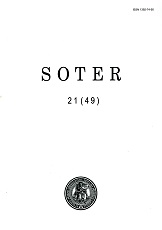Žmogaus laisvės samprata šv. Tomo Akviniečio veikale Summa theologiae (I dalis)
The conception of human freedom in st. Thomas aquinas work summa theologiae (i)
Author(s): Lina ŠulcienėSubject(s): Christian Theology and Religion
Published by: Vytauto Didžiojo Universitetas
Keywords: šv. Tomas Akvinietis; Summa Theologiae; žmogaus laisvė; protas ir valia; liberum arbitrium; valios laisvė; St. Thomas Aquinas; Summa Theologiae; human freedom; intellect and will; liberum arbitrium; freedom of the will;
Summary/Abstract: The article opens with the analyses of the most important work of St. Thomas Aquinas Summa Theologiae. It seeks to comprehend the conception of human freedom. The work is analysed consecutively. The first part of the article deals with the first part of the work (Prima Pars), the continuation of the article examines the second and the third parts (Secunda Pars and Tertia Pars). Two powers of human soul that represent freedom – liberum arbitrium and the will – are analysed there. The powers, their place in the metaphysical structure of human being, and their actions, functions, objects, the problems of relationship of the powers are researched. In order to solve the problem of attribution of Thomas’ moral philosophy to voluntaristic or intellectualistic position, the relationship of will and reason in free human action is analysed. The research concludes by the assertion that both powers of the soul – will and reason – take equal part in the act of liberum arbitrium. Therefore Thomas’ considerations about human moral action should not be treated as voluntaristic or intellectualistic. He speaks about equal importance of both powers of soul. Further Thomas’ triple meaning of the concept of freedom is envisaged: causative freedom (Aristotle’s notion of freedom), freedom from necessity and natural freedom (freedom from compulsion that is characteristic to natural inclination). Having analysed the every case of usage of the concept of freedom the author comes to the conclusion that Thomas’ conception of freedom is grounded on the combination of these concepts of freedom: in Thomas’ system the foundation of natural freedom is necessary for the causative freedom and freedom from necessity; human action is essentially characterized by freedom from necessity peculiar to human being because of power of reason.
Journal: SOTER: religijos mokslo žurnalas
- Issue Year: 49/2007
- Issue No: 21
- Page Range: 31-42
- Page Count: 12
- Language: Lithuanian

